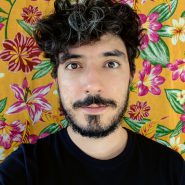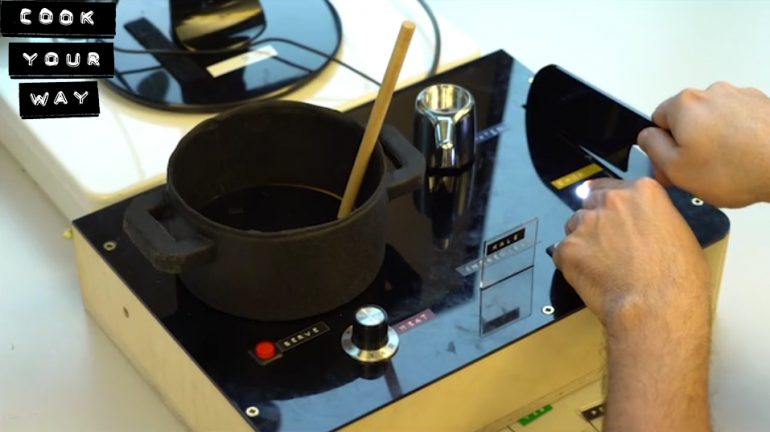 TAG Profiles is a blog series that explores the work of current TAG scholars. Enric LLagostera is a game-maker and a graduate student in Concordia’s INDI Program.
TAG Profiles is a blog series that explores the work of current TAG scholars. Enric LLagostera is a game-maker and a graduate student in Concordia’s INDI Program.
Tell me a little bit about your game project, Cook Your Way.
Cook Your Way started out as part of the reflective game design research group, and grew out of the discussions that developed there. It fits directly into the research questions that I’m tackling in my PhD, which are about alternative controllers and political game design. Cook Your Way is very much an experiment going into this direction. It’s basically a cooking game that’s actually about immigration systems and the different ways that they combine to oppress migrants. In the game you play as a visa applicant from Brazil, trying to enter a country, and as part of your visa application you’re asked to cook typical dishes from your country of origin. You’re being judged by the immigration authorities based on how well you cook them.
What was the inspiration for this project?
It was a mix of things. A part of it was about my own experience as a migrant — the process of being in a new place, navigating immigration systems, forms, dates, deadlines, requirements, and so on. Also, getting used to a new context and having to deal with differences. I have a relationship with cooking where the process of finding ingredients and contemplating recipes carries all these implications about personal history, context, community and more. So part of the idea of the game came from mixing these two things together. It also started threading through things like automated border systems, or the different sites where borders are made: language test centers, the form applications, the brochures from immigration authorities that tell you how to best integrate — this material all started to blend together. Especially this whole narrative about “good” migrants and “bad” migrants that tries to frame the discussion of migration as an individualized thing with this very strong sense of meritocracy. In the game, by taking the structure of a cooking show and juxtaposing it to migration systems, I tried to question that mentally.
What made you choose to use sort of an alternative controller setup for the game?
In the game you have to use a cooking station controller, which has a few components that kind of look like and feel like cooking. You’re stirring a pot, you’re chopping ingredients, you’re opening and closing a tap, you’re doing all this different actions. The idea of working with an alternative controller is the relationship that the object creates as soon as you encounter it. As soon as you find that interface, your relationship with the game changes, and it proposes something to you. The controller is doing some work, and the work that I’m trying to get it to do is defamiliarizing things — having to navigate things that seem familiar but are not. Things that you have an idea of what their goal is, but might actually end up having different ones. Cooking is also super evocative. People have very different relationships with cooking, but the actions and the gestures involved are interesting — they can be super personal or they can be something learned in a very specific way. Cooking is something that can also be optimized or maybe very performative. So, creating the object that does that and reinforces a specific performance of these gestures felt interesting to me.
You mentioned a reflective game design group. I was wondering if you could just tell me a little bit about that and how reflective game design has informed this project?
The reflective game design research group was directed by Rilla Khaled and the members of the group were Rebecca Goodine, Jess Marcotte, Dietrich Squinkifer, and myself. We were working with different approaches to contemplate how games can foster reflection. What aspects of game design — with game design being understood very broadly — can inform this specific kind of experience, and how different fields can come together to support that. How can we make a game that hopes to provoke or suggest critical thinking or, more broadly, open up opportunities for reflection? This is very much based in a specific paper by Rilla called Questions Over Answers, where she outlines a few questions, tensions, and strategies for this type of reflective game design. So this idea of, for instance, favouring questions instead of answering things you do not necessarily have clarity over yourself.
Also, the idea of discomfort in game design and how it can open up opportunities for reflection was important. If you were to make a parallel to other media, things like breaking the fourth wall or aesthetics of estrangement, and how they can be used to create opportunities for dialogue. This is something that we talked a lot about in the research group, alongside the idea of briefing and debriefing — how the transition in and out of a game changes how reflection happens. With Cook Your Way, there is a zine you get when you start the game, and I’m always there, close to players, introducing them to the game in a way that both warns and prepares them for what they’re going to face. This is because the game can be a discomforting thing: it can relive trauma and it can be a difficult subject. So it’s important to create consent for playing, and also help players to reflect upon their experiences when they exit the game.
How does TAG help you realize the goals of your project?
Well, TAG certainly helps with providing infrastructure in many different ways. Both in a material sense of the space, materials, and equipment, but also this idea of access to people who are doing research with different approaches. I find that the conversations with all these different people really brings forward new perspectives on what it is that I’m doing.
How can people follow you online?
You can follow me on Twitter at @enricllagostera and you can view my work at enric.llagostera.com.br.


